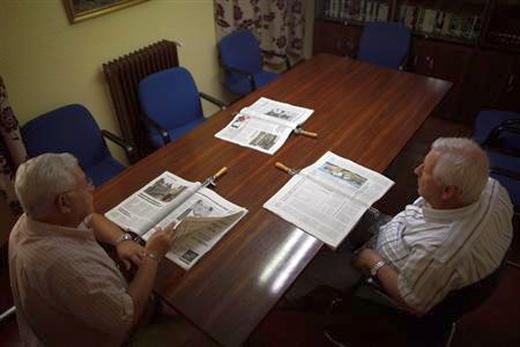
If you're strapped for cash or have a poor credit rating, the offer would sound tempting: upfront cash in return for your future pension payments.
But it's a debt trap, according to a recent expose by The New York Times, a "pension advance" loan charging sky-high interest rates. A Times analysis of these deals found effective interest rates ranging from 27 per cent to as high as 106 per cent.
The companies that market these loans like to target unsuspecting military veterans, teachers, firefighters and police officers.
Pension advances are part of a bigger picture of rising debt burdens carried by a growing number of older Americans in the wake of the Great Recession.
Click NEXT to read more...

Credit cards pose the most serious threat, with interest rates not much lower than the predatory pension loans - average monthly interest rates ranging from 11 per cent to 16 per cent, according to Bankrate.com.
A recent AARP Public Policy Institute report found that average credit card balances for households over age 75 jumped 31 per cent during the recession.
A separate AARP report found that boomers - households over age 50 - now have higher overall credit card debt than younger people - a reversal of previous trends.
The average combined balance on all cards in 2012 was $8,278.
Click NEXT to read more...

The study found the key causes of debt included medical expenses, car and home repairs and basic living expenses.
"The popular image is people going wild at the mall, but we found that it's more about making ends meet," said Amy Traub, senior policy analyst at think tank Demos, who wrote the AARP report.
Howard Krooks, a Florida-based elder law attorney, has numerous clients "on the doorstep of retirement" who have relied on credit cards due to recession-damaged portfolios and lost home equity.
"Not just one, but multiple cards to keep things afloat. For many of them it became a matter of pride, because they didn't want to be dependent on their kids to meet monthly living costs," Krooks said.
Click NEXT to read more...

Bradley Frigon, an elder law attorney in Denver, frequently has seen the opposite problem: older people who fall into a debt trap after bailing adult children out of a financial bind.
"Parents are either advancing money to their children or co-signing loans," Frigon said. "I've seen parents borrow against their home equity to help adult kids get out of trouble or personally guaranteeing loans for them. They're putting themselves at financial risk for the sake of their kids."
Florida-based financial planner Douglas Eaton often works with clients struggling with debt. Eaton offers this checklist for righting the financial ship:
Start with a financial inventory. Eaton works with clients to identify assets and liabilities, income and expenses. "We identify the expenses that are absolutely necessary to run the household, and which are not. But that's a discussion point," Eaton said.
Click NEXT to read more...

You might want to stop paying a long-term care insurance premium because it's not a necessity, but then you're taking a risk that could hurt you down the road.
Target low-hanging fruit. Before going to an austerity plan, Eaton looks for recurring costs that can be jettisoned and are not really necessary.
"Maybe there's a redundant life insurance policy, or an expensive Medigap insurance policy that can be dropped," he says.
Some clients have extra cash sitting in the bank earning a low interest rate while they're paying 15 per cent on a credit card, for example.
Click NEXT to read more...

Reallocate investments for income. Retirees who have Individual Retirement Accounts or 401(k) portfolios can pare debt by restructuring investments to generate dividend income.
"If you have $500,000 in an IRA, and you're only taking the required minimum distribution, that could be generating $27,000 in dividends that can be used to pay off debt without losing principal," Eaton said.
Don't panic. "Older people facing a debt problem get so frightened that they're not thinking clearly," Eaton said. In many cases they just want to be good citizens and pay their debts and bills.
Sometimes they'll make decisions quickly without consulting anyone - "big decisions that can be a mistake," he notes.
That's the point where people are vulnerable to predatory practices - like signing away a pension at a 30 per cent interest rate.
